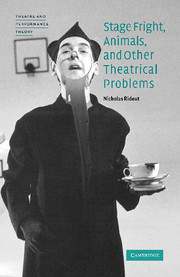Introduction
Published online by Cambridge University Press: 04 December 2009
Summary
Alas! That first matinée was to prove a bitter disappointment.
The boy Marcel, narrator of Proust's Remembrance of Things Past, goes to the theatre for the first time. He is to see a performance of Racine's Phèdre, given by Berma, the greatest actress of the day. He is attending the theatre against the advice of his doctor, who predicts that his illness will be exacerbated, and therefore that he will ‘in the long run derive more pain than pleasure from the experience’. His parents, who had previously forbidden him to attend, have relented, his mother saying ‘“Very well, we don't want to make you unhappy – if you think you will enjoy it so very much, you must go”’. This situation causes him great anxiety: he does not wish to distress his mother by going to the theatre when she would rather he didn't. Even as it becomes clear that he is to go, and that his mother genuinely wants him to enjoy himself, his anxiety barely abates, since ‘this sort of obligation to find pleasure in the performance seemed to me very burdensome’.
But as the day of the performance dawns his joyful excitement at the prospect ahead of him overwhelms his anxiety, and he is full of pleasurable sensations. His pleasure increases once he has taken his seat. The theatre itself, the fact that he enjoys an unobscured view, the sounds of last minute preparations behind the lowered curtains all contribute to this pleasure.
- Type
- Chapter
- Information
- Stage Fright, Animals, and Other Theatrical Problems , pp. 1 - 34Publisher: Cambridge University PressPrint publication year: 2006

